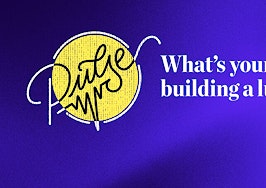This article series is largely taken from the The Real Deal: Billion Dollar Real Estate Broker with permission from the author.
I’m always shocked by the way the best people in real estate throw their entire business away once they decide to retire. They’ve built a strong brand and a customer database that can stretch into the thousands.
They have an impeccable reputation — networks of not just buyers and sellers but investors, contractors, suppliers, bankers, inspectors, government contacts and property managers. They’ve developed successful working business processes, unique techniques and effective approaches.
Then, one day, they throw a final office party, get on a plane to Florida and fly away! What happens next? Most of that agent’s clients get slowly farmed out to the top dozen or half dozen other agents in the office. What’s left over gets picked clean by the remaining Realtors.
The LEXIT Strategy is an exit strategy that involves leveraging your business, your knowledge, your brand and the networks you’ve built, and monetizing your license even after you leave your office and your day-to-day routine behind.
Do it right, and you’ll transform a dead-end exit strategy into a passive, multiple-streams-of-income strategy that will generate revenue for you and your family for a long time. Here are the top five ways to leverage your exit.
1. Don’t abandon your database
When you decide to close your practice, don’t abandon your database to anyone who wants to cannibalize it — sell it. Not for a one-time cash sum (though that’s an option too, if the price is right) but as a collection of leads.
Sell it as you would any other collection of leads. Do what lead generation services do — sell those leads in exchange for at least 25 percent of any commissions made using the leads you supply.
Of course, not every Realtor will agree to that arrangement, especially if the agent feels the leads are fairly cold. There are, after all, many sources of leads. Another, warmer source might yield more commissions. So take the next few steps, and heat up those leads.
2. Don’t let your branding evaporate. Share it!
Think of your practice the way other professionals do. When doctors retire, they don’t drop their list of patients like a hot potato. They contact each one and tell them they’re passing their care along to a new doctor — a qualified professional they fully recommend and have already familiarized with their case.
Sure, they can find another doctor on their own. But why go through all the trouble of searching when someone they’ve worked with and trust assures them this is the person to go to?
There’s no need for cold calling or extended persuasion to make this introduction and transition. Just let a client know you’re retiring and passing their care along to another agent. They’ll agree because that’s what doctors, dentists and insurance agents do.
This does involve a little work — but very little. You can mention the new person in your marketing material, for instance or send a mass email. You can do more than that. You can have the new agent come along on visits several months before you retire, and you can introduce them personally.
You can also include your branding collateral and information on how to use them and how well each works. After all, your branding involves your logo, ad space, phone number, email address, website, flyers, postcards, YouTube, Facebook, LinkedIn, Instagram accounts and your social media firm.
When buyers and sellers in Cambridge see the Susiwala logo, they call. It doesn’t matter if they’re a formal part of my database or not. My marketing generated my leads in the first place. Why switch it off and throw it away? Why not just pass it on — for reasonable compensation?
Is it worth something to the agent receiving your leads to have the right to put that logo on their marketing material and not to have to build up an equal level of credibility over decades from scratch? You bet it is. Monetize that value.
3. Sell your system
Sell it possibly as a package involving consultation, coaching and training. If you’ve built a successful real estate practice — a high revenue-generating business operation — it’s because you’ve built effective methods of listing, presenting and marketing.
If you can give your successor (or groups of successors) a series of hands-on instruction and practice in exactly how to execute those procedures and apply them for maximum profit, it can be worth its weight in gold.
You can pass along the physical materials and operations manuals of a business, and that will be a giant step forward to someone without those things.
But without the skills to use them properly, what’s the point? It’s like passing along Eric Clapton’s guitar to someone who doesn’t know how to play. To someone who really wants to learn to play, lessons from Eric Clapton himself would be priceless — and monetizable.
4. Sell your knowledge
What you’ve learned about real estate in the course of an entire career isn’t valuable only to the person who’s taking over your client list. Once you realize that the public regards you as a qualified professional and that your marketing has helped make you, personally, a well-known brand, there are many ways to monetize your knowledge without buying or selling a simple home.
This includes doing keynote speeches, master classes and consultative work, writing books, coaching, creating info products, and so much more. (I’ve heard people say that Robert Kiyosaki makes more money talking about real estate than he does buying or selling it. It may or may not be true, but it’s certainly true of other real estate speakers and trainers.)
You don’t even have to wait for retirement to leverage your license in these ways (and retirement doesn’t mean throwing away your license any more than retiring from a university job means throwing away your Ph.D.).
Call the library, and offer to give a talk about buying a house. You’re marketing yourself, you’re building a list, and you’re gaining the experience to be a business speaker. There are some people who make more money talking and writing about real estate than some do selling it. Why not do both?
You don’t even have to master every last thing there is to know about a subject — just enough to satisfy the curiosity of the people who come. If you’re a seasoned, experienced real estate agent, start thinking of yourself as someone with unique professional knowledge that you can share with colleagues, fellow investors and a paying public eager to learn more — because it’s true.
5. Leverage your networks
If you’ve done a good job in the course of your real estate career, you’ll have built up groups of connections that are far larger than just the database of your buyers and sellers. There’s also your network of investors, for instance.
Closing your office doesn’t mean you’ll never buy another good investment property or partner with others to fund it. It doesn’t mean you can’t develop a new project or put money into a deal someone tells you about and invites you to join. It’s much better to start developing these networks earlier rather than later.
All you have to do is simply educate every client you have properly, and let them know that it makes considerable sense to take some equity out of their home and invest it in an income-generating property. You’ll quickly build a list of people interested in investing in projects — projects that you, yourself, are investing in too.
This investor list may or may not be part of the package you sell to the agent or agents who succeed you. But then those agents may be part of your after-office investment network too — showing them how to develop homeowners into wise investors may expand the network for you all.
Those aren’t the only networks you’ve developed. A home looks like a good investment, but does it need work? You have a network of contractors too. Yes, those networks may take a little imagination to cultivate. But why stop playing a game you enjoy and a profession you love just because you’re no longer doing it 9-to-5?
One last note — don’t retire your license. Compensation can continue to flow through a brokerage.
Faisal Susiwala is a broker at RE/









